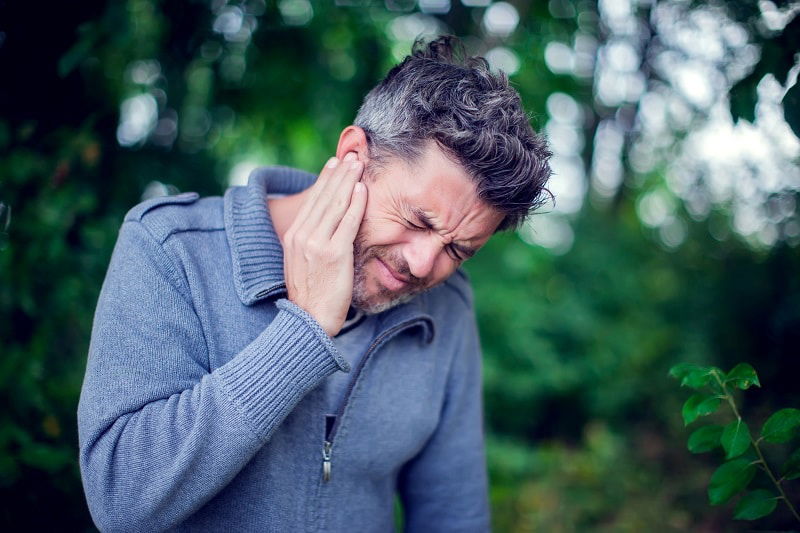Many people around the world get headaches, some once or twice a year, others several times a week or even per day. Whether it’s a slow and gradual pain creeping up from tense shoulders as you sit at your desk working through a stack of paperwork, a mild annoyance you wake up with on occasion, or a frequent visitor that slams into your skull like a baseball bat that leaves you crawling for a dark room with a bottle of prescription-strength pills and an ice pack, it’s all miserable.
Chronic cases of headache disorders can involve migraines, tension-type headache (TTH), and headache caused by medication overuse. For those who regularly suffer from non-migraine headaches, they are up to three times more likely to suffer from tinnitus, sensorineural hearing impairment, and sudden deafness when compared to those who don’t suffer from chronic headaches, according to Taiwan’s recent research.
Both tinnitus and hearing impairments are common among those who suffer from headaches, and as such, researchers dove in to try to gather more facts on the topic. The study, based in Taiwan, included 43,294 patients with non-migraine headaches, and 173,176 with no recorded headaches of any kind (considered the control group).
The study excluded patients who experienced multiple conditions before the index date such as schizophrenia, brain lesions which included both benign and malignant brain tumors, basilar artery syndrome, and several other conditions.
Information was compiled from the Longitudinal Health Insurance Database of the Taiwan National Health Insurance Research Database with a date range from January 1, 1996 to December 31, 2012. All research was completed based on documentation held by this organization and not on patients physically in the care of the research team.
The average age of the non-migraine group was 28 years (± 14 years) and was 58.5 percent male. The research team used the Kaplan-Meier method and logrank tests, as well as a Cox proportional hazard model to determine the incidence rates of tinnitus, sensorineural hearing impairment, and sudden deafness to determine the association of all three conditions in the non-migraine headache group.
The Kaplan-Meier method, logrank tests, and the Cox proportional hazard model are all used to evaluate different aspects of survival analysis, incorporating quantitative predictor and categorical variables. By utilizing these various methods of testing, researchers were able to determine that the non-migraine headache group was the higher risk group for developing these issues.
Researchers followed each individual’s documentation from the study’s initial start date (January 1, 1996) until they were first diagnosed of tinnitus, sensorineural hearing impairment, sudden deafness, death, or cutoff date of the study (December 31, 2012), depending on what came first. Death was presumed when the patient was withdrawn from Taiwan’s National Health Insurance (NHI) program. The presence of comorbidity, or two chronic conditions or disease in a patient, as well as their geographic location, and level of civilization was significantly different between the non-migraine and control groups.
A yearly hearing evaluation is the best way to catch any potential hearing loss, but if you suffer from non-migraine headaches, pay close attention to any of the symptoms of tinnitus, sensorineural hearing impairment, or sudden deafness.
Tinnitus can be characterized by any one of the following:
- Buzzing
- Chirping
- Clicking
- Hissing
- Music
- Ringing
- Whistling
- Whirring
- Whooshing
Sensorineural hearing impairment is one of the most common types of hearing loss though there is no cure. Some of the symptoms include:
- Diminished ability to distinguish among different speech signals
- Perception of loudness is affected
- Reduced sensitivity to soft sounds
Sudden hearing loss is just that, sudden. Over a short period of time, your hearing diminishes until you are unable to hear. This condition is considered a medical emergency and anyone who experiences a sudden inability to hear should seek medical treatment as soon as possible.
While some could argue that hearing loss can lead to listening fatigue and headaches, in this case, the presence of headaches occurred before any signs of tinnitus, hearing impairment or hearing loss was documented.
Some headache sufferers will experience the occurrence of unilateral, or single ear tinnitus or hearing loss, while others may experience the condition in both ears, or bilaterally. This research has offered great insight into these conditions and is paving the way for future studies.
Though headaches don’t top anyone’s list of fun things to do, they do offer opportunities to study the conditions that cause them and the symptoms that they result in. In the future scientists may come up with a way to lessen the risks associated with these often painful and always annoying outbreaks.
If you or someone you love suffers from chronic non-migraine headaches, be sure to have your hearing tested regularly by an audiologist or other hearing health professional.




